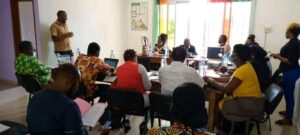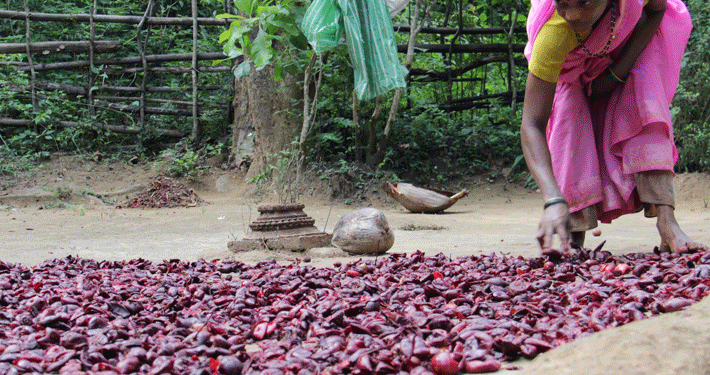Cameroon’s forests are an intergral part of the Congo Basin, which is the second largest forest on the planet, after the Amazon. These forests are rich in biological diversity, including non-timber forest products (NTFPs) whose socio-economic and environmental importance is well established.
NTFPs are used for food, pharmacopoeia and as a raw material for craft and construction of habitats, and it’s marketing improves household income.
“We have six children, and my husband and i depend only on the sales of non-timber food products like Eru, to sustain the family,” a “buyam sellam” told News Upfront at a renowned food market in Yaoundé.
In Cameroon, like elswhere in the Central Africa Sub Region, NTFPs constitute a regular source of income (even though not the most important) for rural households due to their diversity. About 38% of vegetal NTFPs are used as food and the annual economic value for 16 of them is estimated at 32 billion FCFA according to studies.
Leaves and nuts from Cameroon’s vast lowland humid forests; honey, bamboos and gum arabic from the savannah; and barks, honey, raffia, bamboo and cola nuts from the mountain forests have been used for centuries.
These non-timber forest products (NTFPs) are of biological origin and derived from natural, modified or managed forested landscapes and wooded land and trees outside forests. They are used for subsistence, medicine, food, energy, tools and cultural uses.
They have been traded near and far, generating cash and creating markets currently worth over 32 million US$ annually according to studies.
These products move and change in value and substance from the forest through harvesters, to processors, traders, and retailers to consumers in Cameroon and worldwide. The chains operate in dynamic, changing and complex settings. Whilst the harvest zones in Cameroon are characterised by persistent poverty and low levels of infrastructure, in urban areas people have been gradually becoming wealthier.
Livelihood benefits from NTFP harvesting and trade have been widely acknowledged, but the sustainability thereof is subject to concern. Overharvesting has been amply reported. Governing NTFP chains for sustainability is therefore necessary to guarantee long-term livelihood security to actors involved in the chain. A livelihood is deemed sustainable when it can cope with risks and recover from stresses and shocks.
Due to the diversity of products and contexts there is however no ‘one-size-fits-all’ solution for sustainable NTFP management. This raises the question of how different governance arrangements are combined into context- and product-specific configurations and how these affect the sustainability of livelihoods, trade and resource management.
The Lagal Framework in Cameroon
Many initiatives have been taken to better supervise and boost the NTFP sector in Cameroon, such as the validation of the national NTFP Development plan, and more recently the adoption of the decision No. 0209/D/MINFOF/CAB and No. 0210/D/MINFOF/CAB of April 26, 2019 relating respectively to the classification of Special Forest Products and Non-Timber Forest Products, and fixing the methods of collecting and putting into circulation Secondary Non-Timber Forest Products.
“This is good news because it will undoubtedly facilitate development of the sector in Cameroon, but again the decisions have created barriers for local and indigenous communities to make use of the opportunities that are available in the sector.” Says Aristide CHACGOM, Coordinator of Green Development Advocate (GDA).
Results of an analysis of governance in the sector was presented to NGOs in Cameroon on June 30, 2021 during a discussion organised by GDA.
Recently, and to better address the situation, Green Development Advocate (GDA) organised a meeting to advocate for the relaxation of the legal framework for the collection and marketing of NTFPs in favour of local and indegenous communities.

“If the law is there, it is a good thing, but if the law cannot serve it’s people positively, then there is no law” says Moses Tabe, coordinator of FORUDEF an NGO specialized in NTFPs, based in the South West region of Cameroon.
The scribe of FORUDEF presented a challenging situation with the legal instruments in place. They have tried to group women in local communities charged with the collection and marketing of NTFPs, into Common Initiative Groups (CIGs) but they are faced with one major difficulty.
“To collect and market NTFPs, you need an authorisation licence, but to obtain authorisation, you need to show record of collection for a while, how then can these CIGs cope, the law is not helping things out.” Laments Moses Tabe.
Local communities dealing with NTFPs are not satisfied with some aspects of the legal framework.
During the meeting, the German Corporation, GIZ declared to have worked with them and most often, they say the documents needed to collect and market the products are not only costly but difficult to obtain.
“We are far off in Muyuka, South West Region, and most of the documents are to be collected at the level of the Ministry of Forest and Wildlife in Yaoundé,” recounts Delphine, a farmer in Muyuka who says it is difficult for them to have access to the documents.
“Some of the taxes are even valid for one year, whereas at time some seasons are not usually favourable for collection and marketing, meanwhile we are forced to pay regeneration taxes even before collection” she continued.
The government of Cameroon through the Ministry of Forest and Wildlife, is aware of the challenges faced by local communities in the collection and marketing of NTFPs and strongly indicates that changes would be made where neccesary.
“What we should know is that the laws governing the sector are for the interest of all, the Ministry of Forest and Wildlife is not working alone, it is a government chain including the Ministry of Finance and other Ministries” says Mezogue Ntoune Epse Kombang, Scribe at the Centre Regional Centre of Transformation at the Ministry of Forest and Wildlife.
Madam Mezogue, talking during the meeting organise by GDA reassured public opinion that some documents are obtained at the level of the Division, and farmers are free to indicate as many products as possible that they want to collect and market.
In the face of these barriers, Green Development Advocate, after examining the situation has made some recommendations.
That procedures for issuing the required document for the collection and marketing of NTFPs should be decentralized.
That the certificate of Non-Royalty, one of the documents required for the application file for the collection authorisation should be suspended, because there are preliminary documents to be provided which does not make it easier for the Indigenous Peoples and Local Communities (PACLs).
That the payment of the Regeneration tax for Category C NTFPs which are fruits or leaves should be eliminated since the resource is not destroyed.
That the validity period of the authorization to category C NTFPs which is presently one year should be revised to two years.

One major aspect where both the government and NGOs working in the NTFP sector agreed on is the fact that Regeneration Tax collected at the level of the Ministry of Finance should be allocated to the various councils, which presently is not the case, for the money to serve the purpose it deserve.
GDA it should be noted is a civil society organization under Cameroon law, created in 2009 and legalized on July 30, 2011. It works for development that respects social and environment requirements.








